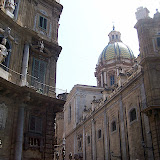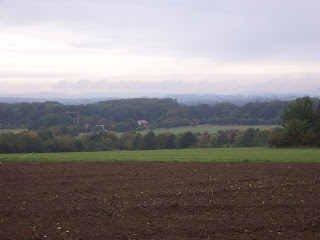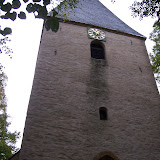Pictures from our trip to Sicily
Sunday, 9 May 2010
Sunday, 18 October 2009
In Berlin
3 October 2009
Jason says: Catherine captured our time in Berlin well. Here's what stood out for me...
Catherine says: I like Berlin. We stayed in a large (former) East Berlin apartment block at Strasbergerplatz. Large functional blocks line many streets in this part of the city and, according to the apartment owner, prior to German unification our block housed members of the STASI on account of the fact that it provided larger and more luxurious accommodation than that of most (an equal) East Berliners. I don’t know if his story was true - he may have decided to add a bit of spice to his sales pitch – or maybe we looked like former members of the Politburo. Jason’s holiday “Lenin-look” beard and the Kalashnikov poking out of my rucksack may have created this impression. However our newly decorated apartment showed signs of another great attempt at creating an egalitarian and classless society – IKEA. What better way to control…er…I mean, empower the proletariat than arm them all with their own, identical flat pack furniture? Personally speaking, interrogation by the STASI seems a whole lot more attractive than an afternoon in IKEA.
It’s twenty years since the wall came down and there was a day of celebration in Berlin on Saturday. We headed to the Brandenburg Gate and joined in the party by watching the German version of the X factor final on a large screen followed by a local band perform. I can see why German pop music never really caught on….but it was fun and given that there were so many people out and all dedicated to drinking as much beer as possible, it was a great atmosphere and felt like a real celebration.
4 October
On Sunday we headed to experience the centrepiece of Teutonic culture - Oktoberfest. Berlin's version was on a significantly lesser scale than that of Munich. Having walked for an hour through some of the less salubrious parts of the city and then along the more scenic riverside to get there, we were brimming with anticipation as we approached the welcome sign and police cordon. Having got the body and bag search over with we headed for beer tent. Perhaps because it was Sunday afternoon or because Berlin doesn't even try to compete with Munich, but frankly it was disappointing especially as Jason had gone to the trouble of dusting of his lederhosen and I was wearing my finest dirndl. We arrived as the 'entertainment' was starting. I don't know about you dear reader, but ladies dressed as nuns, lip synching to bad pop music and then stripping down to their knickers and vests doesn't really do it for me. The waitresses did not live up to the depiction on the posters where they were young, lovely and smiling. Mostly they were grumpy middled aged women (and so was I by that time) wearing comfortable fleeces over washed out dirndls and comfy trainers over their bunions didn't add to the party atmosphere. However after a few pints of something local we cheered up and left.
Sunday evening
Possibly the highlight of Berlin for me was the visit to Berlin's parliamentary quarter - the Bundestag. The Reichstag Building with its 19th century exterior conceals a modern masterpiece topped by a magnificent glass cupola designed by Norman Foster. The design of the cupola along with the liberal use of glass partitions throughout the building allows you to see directly into the plenary chamber - the centre of government business - and deliberately is aimed to create a sense of transparency - 'shedding light' on government proceedings. The other buildings are equally inspiring, especially the Marie-Elisabeth Luders building, which is the work of Stephan Braunfels and sits the other side of the river Spree.
5 October
We went to the site of Checkpoint Charlie. This is an odd place, not least for its history but also because of the way it's presented as a tourist attraction. It all seems quite lighthearted and you can get your photo taken with an actor dressed as a border policeman. When you think of the people who died trying to cross the border and the families and friends split apart because of the wall, it doesn't feel quite right. Remembering the period of the Cold War and the fear of communism that gripped the west, it made me wonder of in twenty years time we'd be having photos taken with Osama Bin Laden lookalikes at an all inclusive resort in Afghanistan.
Jason says: Catherine captured our time in Berlin well. Here's what stood out for me...
- Attending the 20 year anniversary unification concert near the Brandenburg Gate. We were in the city that epitomized The Cold War and the divide between philosophies like democracy, communism, capitalism and socialism. The concert dragged due to less than stellar German entertainers but the moment was special
- Staying in a former East Berlin apartment near Karl Marx Allee
- Touring the spectacular Reichstag building (German parliament) at night
- Drinking in bars along Oranienburger Strasse. For some reason those places seemed a bit grittier and more real than other bars around town. A healthy dose of locals and prostitutes added to the atmosphere of the area
- Doing touristy stuff like going to Checkpoint Charlie, the (disappointing) Jewish Museum, the (especially disappointing) Berlin Oktoberfest, wandering around Museum Island and the Sony Center in Potsdamer Platz and touching remains of the Berlin Wall
- Having a great meal at the wonderful Gugelhof restaurant on our last night
Sunday, 11 October 2009
149 years
2 October 2009
Jason says: We caught a train from Bielefeld to Herford and then a bus to Spenge and arrived at the town hall on a rainy day. Spenge is the local town where the Moellerings likely went to church, bought and sold crops and equipment and where some of them died.
Our first stop was the Lutheran Church of Sankt Martin, a church established in the 13th century and rebuilt in the 19th. Even if my family didn't go to the church, they certainly knew and saw it. As we approached, the minister, a woman named Claudia, greeted us and gave us a private tour of the now modernized interior and showed us a wood crafted alter screen from the 13th century - a relic my relatives probably saw and served as a link to their lives.
Lovely landscapes
From Spenge we walked to Hucker Kreuz, the village and farmland where the Moellerings lived and worked. What struck me as we approached was the beauty of the landscapes. For some reason I expected it to be a place that would somehow be plain...but it wasn't. There were lush fields and panoramic views across rolling hills. It was a good place to live and, I imagine, difficult to leave.
As we came into the village we spotted more connections to the past - a barn built in 1792 and then a windmill, built in 1860, the year Hermann and his brothers left for the U.S. Had they seen the windmill being built before they left? I wanted to think so.
We trekked on and approached the Moellering property. After a lot of research and planning, mainly due to Catherine and my aunt Janet's work, we were on the verge of seeing the very spot where my family lived for generations and where Hermann said goodbye as a teenager and made his way to a new, unknown land. Then we were there. An ordinary two story home sat where the original house must have been amongst a grassy, tree and bush-filled yard.
To anyone else, it would have been an unspectacular sight, but, to me, it was a Mecca, a place where the past and the present connected after 149 years. I felt like some sort of representative for all generations of our family and I was standing at the place that brought us all together. In a way, I had come home.
Catherine says: It was pretty interesting talking to Claudia, the church minister in Spenge. Once Jason had explained our reason for visiting the area, she immediately asked if Herman’s departure was in the 1840s or 1860s as this was the period of mass immigration from the area to the US. The failed 1848 revolution, local crop failures and financial incentives, amongst other things, had attracted huge numbers of immigrants to the US.
Having successfully navigated our way to Spenge using trains and the local bus service, we decided to walk the couple of miles into Hucker Kreuz. When Jason asked “Are we there yet?” for the third time, I encouraged him to reflect on how modest a journey it was compared the distance travelled by Herman and the rest of the Mollring crew. That’s an abridged version of the conversation.
The scenery was really lovely – all lush green fields and plump cattle. The houses and farms were all large and well cared for and it seemed like an area with a buoyant economy, unlike during Herman’s lifetime.
For more photos check out the following...
| Mollring Quest in Hucker Kreuz |
Sunday, 4 October 2009
Base camp
1 October 2009 continued
Jason says: Bielefeld is the largest city near where we wanted to get to…the town of Spenge and the village of Hucker Kreuz. My expectation was that the city would be forgettable but, to my surprise, it was more pleasant, attractive and seemingly wealthier than I thought it might be. It was downright charming and pretty.
Bielefeld has a castle on a hill overlooking its regional kingdom and churches with tall spires that stretch way up into the sky. The city center is quite posh with Bang & Olufsen, Hermes and designer shops and maintains a sense of efficiency, order, cleanliness and, interestingly, openness. It is the type of community politicians around the world aspire to create for their cities, states and nations.
After wandering around, we challenged ourselves to avoid the safety of eating at our hotel where we knew we could speak English but, instead, to try an attractive Mediterranean restaurant that appeared full of locals. We chose wisely. Even though we sheepishly muttered our orders in German, the waitress was kind and replied back in English. Then she brought out a fine meal of fresh made bread, padron peppers and beautifully prepared fish.
We were off to a good start.
Catherine says: Bielefeld does not suffer from the 'clone' effect that so many regional cities and towns do in the UK and US. There seemed to be many independent shops alongside some of the usual (inter)national brands. As far as I could tell there were at least two theatres and lots of cultural activities going on, probably not too surprising for a university town. Being Oktoberfest season, Jason was on the lookout for a local version of the Bierfest. Our limited grasp of German led us to believe that such an event was being held in a local hall. Flushed with success and after a vigorous 45 minute walk out of town we arrived at the hall where we were able to watch local Bielefeldians practice their badminton strokes. Clearly we had confused Bier and Badminton. Better for the liver but less fun. I couldn't help wondering if the Mollrings past had journeyed into town for a spot of badminton on a Thursday night....
Jason says: Bielefeld is the largest city near where we wanted to get to…the town of Spenge and the village of Hucker Kreuz. My expectation was that the city would be forgettable but, to my surprise, it was more pleasant, attractive and seemingly wealthier than I thought it might be. It was downright charming and pretty.
Bielefeld has a castle on a hill overlooking its regional kingdom and churches with tall spires that stretch way up into the sky. The city center is quite posh with Bang & Olufsen, Hermes and designer shops and maintains a sense of efficiency, order, cleanliness and, interestingly, openness. It is the type of community politicians around the world aspire to create for their cities, states and nations.
After wandering around, we challenged ourselves to avoid the safety of eating at our hotel where we knew we could speak English but, instead, to try an attractive Mediterranean restaurant that appeared full of locals. We chose wisely. Even though we sheepishly muttered our orders in German, the waitress was kind and replied back in English. Then she brought out a fine meal of fresh made bread, padron peppers and beautifully prepared fish.
We were off to a good start.
Catherine says: Bielefeld does not suffer from the 'clone' effect that so many regional cities and towns do in the UK and US. There seemed to be many independent shops alongside some of the usual (inter)national brands. As far as I could tell there were at least two theatres and lots of cultural activities going on, probably not too surprising for a university town. Being Oktoberfest season, Jason was on the lookout for a local version of the Bierfest. Our limited grasp of German led us to believe that such an event was being held in a local hall. Flushed with success and after a vigorous 45 minute walk out of town we arrived at the hall where we were able to watch local Bielefeldians practice their badminton strokes. Clearly we had confused Bier and Badminton. Better for the liver but less fun. I couldn't help wondering if the Mollrings past had journeyed into town for a spot of badminton on a Thursday night....
The lead up
1 October 2009
Jason says: Getting to departure was intense. Work event on Saturday, half marathon on Sunday, 3 days to wrap up work….meetings, reports, last minute firefighting. Amongst this my MacBook seemingly died which prompted me to cuss and yell. I was going to be denied email, music, videos and the new Nick Hornby audiobook. Fortunately, later that night I revived the machine and all was right with the world…although I suspect my tantrum caused me to lose points with Catherine. Anyway, amateur IT repairs and last minute packing meant that I went to bed too late (2:30am) and got up too early (5:30am). But, we got out the door on time.
Transport-wise, so far so good. Trains to Brussels then into Germany were roomy, comfortable and fast. However, food for pseudo-vegetarians is in short supply.
Catherine says: I couldn't possibly comment on Jason's Pre Journey Tension (PJT). Suffice to say I recognise that the relationship with aforementioned MacBook laptop is pivotal to Jason's existence.
The journey was unbelievably easy. It's far harder to cross London by train than it is to cross the Channel and traverse three European countries. Maybe the legendary German efficiency, which ensure trains arrive on time, are clean quiet and spacious is a factor. The only flaw was the lack of on board veggie cuisine. You can have Bratwurst, Knackfurst and Hahnchenknusperfilet to your heart's delight but meat free brings expressions of concern and sharp intakes of breath. Deutsche Bahn must have got a very good deal on end of line salami and emmenthal cheese. Our market research, albeit it not totally scientific, revealed that the ONLY sandwich available on DB trains is the "Salami mit Emmenthal" variety. That is, apart from the Fitness Baguette, which involves unfeasibly large quantities of chicken mayonnaise stuffed into a 12" baguette. Presumably the fitness element refers to the effort needed in lifting it.
We arrived in Bielefeld, via Brussels and Cologne, expecting nothing more than a dull provincial town. Maybe Coventry or Fresno on a wet Sunday afternoon (more likely to be wet in Coventry). The reason for visiting was that it seemed to be the closest we could get to the seat of the Mollring dynasty at Hucker Kreutz. More to come on Bielefeld....
Subscribe to:
Posts (Atom)





